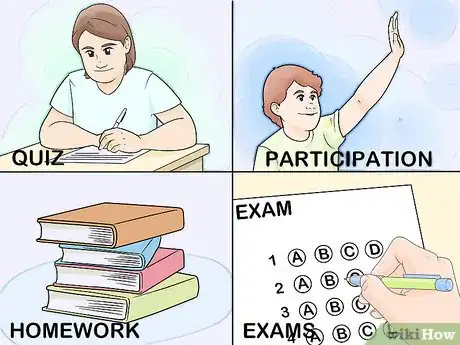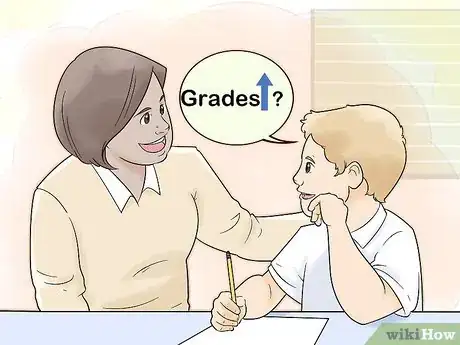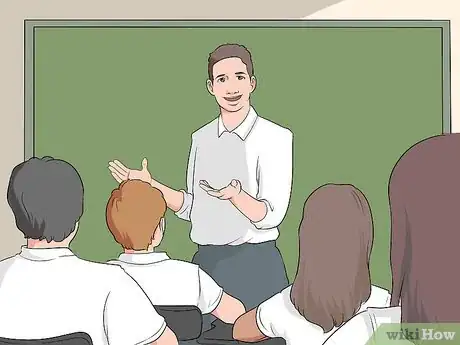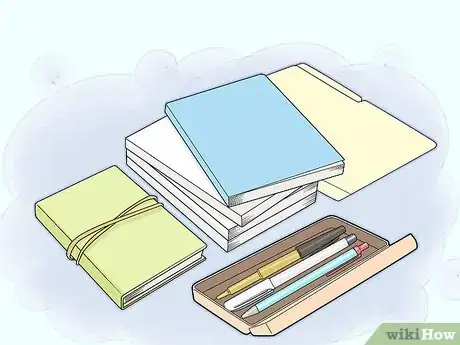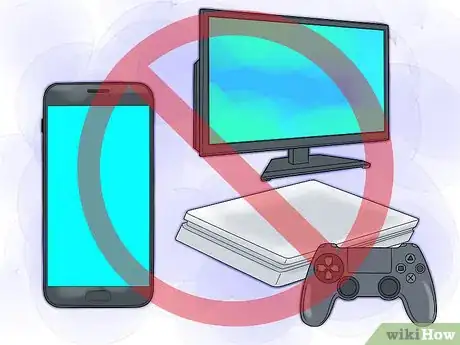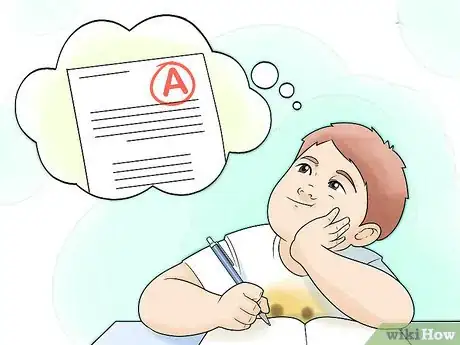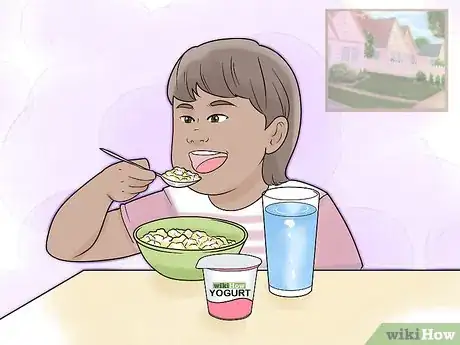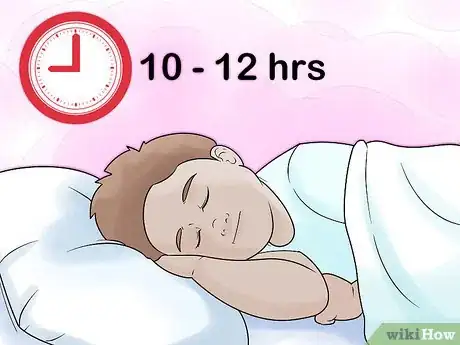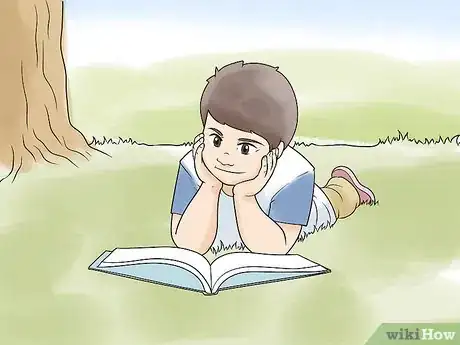This article was co-authored by Emily Listmann, MA. Emily Listmann is a private tutor in San Carlos, California. She has worked as a Social Studies Teacher, Curriculum Coordinator, and an SAT Prep Teacher. She received her MA in Education from the Stanford Graduate School of Education in 2014.
There are 15 references cited in this article, which can be found at the bottom of the page.
This article has been viewed 33,600 times.
There are lots of things you can do to get better grades. Just remember to talk to your teacher and parents so they can help you. Remember that everyone, including you, wants you to get the best grades possible. There are many years of school ahead, but it’s never too early to learn good habits for doing good schoolwork.
Steps
Asking for Advice
-
1Find out how your grade is determined. One of the most important things you can learn at the start of the school year is where your grade comes from. This means asking what assignments get a grade, and how much each one is worth. This will let you know what the really important assignments are. Your teacher probably gave you some of this information at the beginning of the school year, but it can always help to ask.[1]
-
2Ask your teacher about ways to improve your grade. Remember that your teacher is the person who gives you grades, so if you want to make sure your grades get better, your teacher is the first person you should ask. If your grades aren’t as high as you want them to be, talk to your teacher so they can explain why you got what you have, and specific things you can do to improve.[2] Here are some examples of questions you could ask:
- "What should I do to get a better grade?"
- "Why did I get that question wrong?"
Advertisement -
3Talk to a parent or guardian. If you want to get better grades, talk to your parents about it. This doesn’t just mean talking about your problems. It is important to talk about school with your parents as much as you can. Make sure you tell them about the subjects you are learning, and any problems you are having. If you don’t tell them, they may not know there are any problems.[3]
-
4Have a parent or guardian talk to your teacher. They can talk to the teacher during a conference, or they can plan a meeting. Ask your parent or guardian to talk to your teacher about how you can get better grades. Just remember that if your parents give you advice from your teacher, you should follow it.[4]
-
5Ask for extra help. If you, your parents, and your teacher are working hard, but just can’t get your grades up, maybe someone else can help. This can be a tough thing to ask for, but depending on your issues, it might be the right thing to do.
- One thing to do is get a tutor, someone who knows the subject really well and can work with you directly to help you get it. Because they know the subject very well, and are meant to work closely with you, they can give you more one-on-one attention. Tutors can cost money, though, so talk to your parents about it.[5]
Building Your Academic Skills
-
1Sit up front, or ask the teacher to assign you a seat in the front. This can be tough in some parts of elementary school because you have assigned seating. However, if you have the chance, try to get a seat close to the front or ask your teacher to assign you a seat near the front of the class. You’ll be closer to the teacher, more engaged in what your teacher is talking about, and you’ll remember more information.[6]
- If your class is doing some activity out of your chair, that would be a great chance to make sure you get up in the front.
- Also, if you sit in the front, you will be less likely to fool around.
-
2Participate in class. Raise your hand to ask questions, and answer questions. Most teachers really like it when students raise their hands. You won’t get in trouble for giving a wrong answer, as long as you're doing your best. Even if you are wrong, it will give the teacher an opportunity to give you the right information. That way, when the question comes up on the test, you’ll be ready.[7]
- This means asking questions too. If your teacher says something and you don’t understand it, ask them to explain it again. This will show the teacher that you really want to know the information, and do well in class. You can ask during class, or write down your questions and ask the teacher after class is over.
-
3Take good notes. Writing down information that your teacher gives you is important. You might already be doing this, but you can always improve. Make sure you have enough paper and pens/pencils when school begins so you are always prepared to be writing when your teacher starts talking.[8]
- You shouldn’t write down everything your teacher says, as you’ll never be able to keep up. Instead, listen to the teacher when they tell you something is important. Write down information that gets put on the board. These pieces of information are definitely worth remembering, and knowing them will help you do well on graded assignments. You can also talk to your teacher about better ways to tell what information is really important for you to know.
- There are many different ways to take notes, and you should look for the one that helps you understand information the best. Try outlining your information, where you divide the paper into main ideas and secondary ideas. You can also use visual aids, such as pictures, graphs, or diagrams. You can use different colors or different-sized elements to enhance these changes.[9]
- For older students, you can consider the Cornell Method, which is another way to help you organize and review your notes.
-
4Improve your reading comprehension. You may already be doing all of the reading, and still struggling to get it right. This means you need to improve the way you are reading. You should be able to understand and explain what you just read. If you forget things shortly after reading them, try some of these ideas to help you retain more information and figure out the important parts of your reading.
- Try reading out loud. In elementary school, your assignments will probably be pretty short, so it won’t take too long to get through them. Saying the words out loud will help you understand things more clearly, and make you a better reader.[10]
- If you're allowed, try highlighting important words and phrases in the book, and taking notes. Highlight anything that looks important, and any words you don't know. Later, you can talk about the things you highlighted with a parent, guardian, or friend. You can even draw pictures related to the reading if it helps you.
Improving Focus and Time Management
-
1Organize your school work. Staying organized helps a lot. If you aren’t organized, you’ll lose things, forget to do them, or forget to turn them in. This will help you be prepared, and keep track of what you need to do every night. You can get separate notebooks and folders for different subjects, and a pencil box so you always have something to write with.[11]
- Try getting a planner. You can write down all your homework assignments, and when they're do. It might take some practice to get used to following your planner. Keep working on it. It can help you keep track of things.
- Try setting up your school things the night before school. After you finish your homework, pack up your bag, and leave it in its normal place. This means you won't feel as rushed in the morning, and you probably won't forget anything.
-
2Behave when you are at school. This means following your teacher’s instructions, treating your classmates with respect, and not distracting yourself with cell phones or other books. When you misbehave, you will get in trouble and need to serve some punishment. It is much harder to learn and keep up with work if you are in a time-out, having to visit the principal, or just not paying attention.
- Getting in trouble for misbehaving at school can also hurt your grades. Even if you get all the answers right on your homework and tests, your grade will still not be an A if your teacher lowers your grade because you didn’t pay attention or follow the rules.
- Your parents will probably know the school’s policies for appropriate behavior, including the dress code and appropriate language for reference. If you are unsure about something, talk to them to make sure you are following the rules.[12]
-
3Create a homework routine. Having a regular schedule for doing your homework can be a great help when trying to improve your grades. Do your best to make sure this homework time happens at the same time every day. This will help you get into a rhythm of doing your work at the same time, so you’ll always know when you should be doing homework.[13]
- Don’t forget to think about other activities when you plan your homework time. It’s okay to do other things like soccer practice, dance lessons, or even playdates. Just remember that you need to make sure you have time to do school work in addition to those things.
-
4Cut out distractions. During your homework time, make sure you don’t have any distractions. Turn off the TV, video game, cell phone, and anything that will take your attention away from your homework. This can also mean your parents, siblings, or pets, really anything that might distract you from working. If you aren’t paying attention, that makes it more likely you’ll do something wrong.[14]
- If someone bothers you, say "Please leave me alone. I need to focus on my homework." Get help from an adult if your sibling won't leave you alone.
- Remember that you don't have to answer your messages. If your friends want to talk to you, you don't have to talk to them if you're busy. It can wait until you are ready. If they ask about it later, you can just explain "I was busy with homework. I'm free now, though!"
-
5Have a parent or guardian check your work. When you finish doing an assignment, or reading something, ask an adult in your family to check what you did. They can help you see things that you can improve and check your answers so you know what needs to be fixed. They can also quiz you on reading to see how well you remembered and understood it.[15]
- Make sure that you don't put it off for too long. That way, if the adult notices a mistake you made, you'll have time to fix it without feeling rushed.
Caring for Your Body and Brain
-
1Set a reasonable goal. When you think about getting higher grades, consider what kind of grades you want. You may want to get straight A’s, but depending on where you are in the school year, it might be too late. That’s okay, and you should still work to get better grades, but if you set your goals too high like that, you will only get frustrated if you can’t reach them.[16]
- Talk to your parents and teachers about setting realistic expectations. They know your skills, and can help you from getting too frustrated. They can also help make sure your goals are high enough. Even if you can’t get straight A’s, maybe you can A’s in one or two subjects along with improving all of your scores.
- You can also talk to your parents about getting rewards for good grades, maybe a small raise on your allowance, or a new toy. That way, you’ll have something to work towards. Of course, your parents can always say no to this idea, that’s up to them.
-
2Eat a healthy breakfast every morning. Breakfast helps wake up your brain and give you energy for the day. Make sure you get a healthy breakfast with whole grains, fiber, and protein. Talk to your parents about the best kinds of foods, and ask them to make sure those foods are in your house for breakfast.[17] [18]
- Good foods include fresh fruit, whole grain, low-sugar cereal, yogurt, or trail mix. The nice things about some of these foods are that they are also easy to eat and make. Also, they benefit if you and your parents are in a rush early in the morning (which will probably happen a lot!).
- If you don’t feel hungry when you wake up, make sure to take some breakfast food with you so you can have something a little later in the morning when you are.
-
3Get lots of sleep. You want to make sure you get plenty of sleep every night, as many as 10 to 12 hours, so you are awake and alert at school the next day. If you don’t get sleep, you’ll be tired or irritable during the day, meaning you won’t pay enough attention during school. If your parents set a bedtime for you, follow it.[19] [20]
- Getting a lot of sleep can be tough with so many electronic distractions available. It might be a good idea to shut off phones, TVs, and computers an hour before your bedtime, and make sure there aren’t any such devices in your bedroom.
-
4Keep learning outside of school. Try reading books, or watching videos that teach you things. Reading more can help you become a better reader and writer, which will help improve your grades. You can also learn more about subjects in school that you think are interesting.[21] Find stuff that looks fun to learn about.
- Remember that learning is a skill, so when you do more of it, you’ll get better at it. This will help you do better in school, even with the stuff you don’t necessarily like.
- This doesn’t just mean finding things online or reading comics. Talk to your teacher about books that are good for your reading level and interests so you can find good things to read.
- You can also look for interesting events and activities. Maybe you really like studying science. Along with finding good books on science, you can find experiments to perform at home, or take a trip to a museum with your parents.
- Remember, your goal is to improve your grades, so make sure this extra reading comes after you do your homework.
-
5Don’t quit if you have a learning disability. Sometimes your bad grades happen not because you are a bad student, but because you have trouble paying attention or reading properly. This just means you need extra help. Your teacher, family, and doctor can help you deal with things and do well in school.
- If you're struggling to improve your schoolwork, despite putting in a lot of effort, then talk to your parents. Your doctor or school can test you for conditions like ADHD or dyslexia. The tests might involve answering questions or playing games. Then, they can figure out what you have, and what you need.
- People with learning disabilities need extra help. If you are struggling a lot, then that's a sign that you're not getting enough help. You and your family can do some research about your disability, and what types of things are helpful at school.[22]
-
6Focus on how hard you are working. Try not to focus only on your grades. Think about how hard you are working and all the ways you are growing from that hard work.[23]
- For example, if you are spending more time reading each week, then that means you are working hard and learning!
- If you are studying your flashcards a few times per week, then you are gaining new knowledge from doing that!
Community Q&A
-
QuestionWhat if I don't know how I'm doing at school?
 Elissa SchwartzCommunity AnswerThe best person to ask is your teacher. Ask them what you are doing well, and also ask what areas you need improvement in. This way you know what you have to work on.
Elissa SchwartzCommunity AnswerThe best person to ask is your teacher. Ask them what you are doing well, and also ask what areas you need improvement in. This way you know what you have to work on. -
QuestionWhat do I do if the teachers don't want to help?
 Community AnswerTalk to your parents/guardian and see if they can help you resolve the issues at school.
Community AnswerTalk to your parents/guardian and see if they can help you resolve the issues at school. -
QuestionWhy does my teacher scream a lot?
 Community AnswerPerhaps your teacher is going through something difficult at home, or perhaps he/she doesn't enjoy teaching anymore. Just do your best to pay attention.
Community AnswerPerhaps your teacher is going through something difficult at home, or perhaps he/she doesn't enjoy teaching anymore. Just do your best to pay attention.
Warnings
- Make sure you do your own work and don’t let your parents do it for you. Your parents can certainly help by offering advice and reviewing your homework, but you need to do your assignments. You can get in a lot of trouble for letting someone else do your work, and even if you don’t get caught, you won’t have learned as much as if you had done it yourself.⧼thumbs_response⧽
- Too much stress is bad for you. If you worry so much about school that you get bad stomachaches or headaches, that's a big problem. Sometimes, it's a sign of a sickness called an "anxiety disorder," which means that you worry way too much. A doctor can help if you think you might have an anxiety disorder.⧼thumbs_response⧽
References
- ↑ http://education.seattlepi.com/improve-failing-grades-elementary-school-4135.html
- ↑ https://www.oxford-royale.co.uk/articles/improve-underperforming-grades.html
- ↑ https://www.oxfordlearning.com/why-is-my-child-getting-bad-grades-and-what-can-i-do-about-it/
- ↑ http://www.schoolfamily.com/school-family-articles/article/745-better-grades-you-can-help
- ↑ http://education.seattlepi.com/improve-failing-grades-elementary-school-4135.html
- ↑ http://boyslife.org/hobbies-projects/funstuff/2301/how-to-get-straight-as/
- ↑ http://boyslife.org/hobbies-projects/funstuff/2301/how-to-get-straight-as/
- ↑ http://www.academictips.org/acad/literature/notetaking.html
- ↑ https://www.examtime.com/blog/4-note-taking-strategies/
- ↑ http://www.readingrockets.org/article/reading-aloud-build-comprehension
- ↑ https://www.oxfordlearning.com/why-is-my-child-getting-bad-grades-and-what-can-i-do-about-it/
- ↑ http://kidshealth.org/en/parents/school-help-elementary.html
- ↑ http://www.schoolfamily.com/school-family-articles/article/745-better-grades-you-can-help
- ↑ http://www.schoolfamily.com/school-family-articles/article/745-better-grades-you-can-help
- ↑ http://education.seattlepi.com/improve-failing-grades-elementary-school-4135.html
- ↑ http://www.brighthorizons.com/family-resources/e-family-news/2014-how-to-encourage-children-to-get-good-grades/
- ↑ http://kidshealth.org/en/parents/school-help-elementary.html
- ↑ http://kidshealth.org/en/parents/breakfast.html
- ↑ http://kidshealth.org/en/parents/school-help-elementary.html
- ↑ http://kidshealth.org/en/parents/sleep.html
- ↑ http://www.bigiqkids.com/BetterGradesGuide.shtml
- ↑ http://ldaamerica.org/types-of-learning-disabilities/
- ↑ https://www.edweek.org/ew/articles/2015/09/23/carol-dweck-revisits-the-growth-mindset.html
